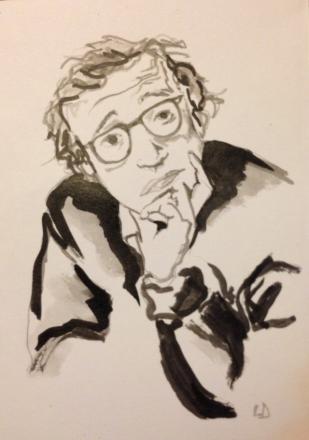
When I wrote some thoughts about Jack Carroll on Britain's Got Talent recently I sang his praises but wondered whether he wrote his own material. This prompted the following response on Facebook from Alan Holloway: "It's not a prerequisite to write your own material, really. Only other comics care about that." I guess there might be some truth in that – the issue of Carroll writing his own material (I checked and he does) is certainly not going to have an effect on the way the BGT voting goes. But it did prompt me to think more about the subject.
Having writers is one of the naughty little secrets of modern comedy. There was very loosely an idea after the Comedy Store Year Zero of 1979 that you wrote your own material or you were an unacceptable throwback. Going back to the pre-TV days it was common for gags to be shared out – sometimes legitimately, sometimes less legitimately. In the music hall era it was possible for a comedian in the north of England and a comedian in the south of England to use the same act in different clubs and the separate audiences would never know.
Sometimes it felt that jokes were commonly owned. In the sixties and pre-Store seventies when comedians were on the same bill they would even divvy up the gags in the wings - "you do the mother-in-law routine, I'll do the getting in late from the pub routine…" And then of course there is the nicking of gags, which has gone on before ad after the birth of alternative comedy, which i'm not going to get into here.
What seems to happen post-1979 is that comedians break through with their own material, but then once they get successful time constraints mean that they need help to meet all their commitments. It is hard enough writing a one-hour show for Edinburgh every year, try writing a six episode show for TV all on your own. Sorry to be a Pol Pot purist about this, but part of the job description of being a stand-up comedian should be the ongoing commitment to generate your own material even if it means you have to turn down the occasional school-fee-paying lucrative voiceover. Ok, you can bounce ideas off a mate if you absolutely must, but you have to hit the keyboard keys – metaphorically rather than literally – because you have to deliver the gags.
Of course as well as being busy there is the additional problem of staying in touch with your audience when you make it big. This is what I call the "life-from-the-limo" problem – I was once told a story about a major comedian who hired some writers and asked them to write him some material about driving around London because these days he had a driver so did not know what the funny side of that was. The temptation to use writers is just too strong, particularly when you are making enough money to delegate.
Yet writing is part and parcel of the comedy craft. If I saw a comedian doing material written by someone else I'm not saying I could never enjoy it, but it would feel like going to a restaurant in London named after a famous chef only to find that the chef in question was searing the tuna in his Paris branch that night. I'd still eat the food and I might even enjoy it, but the experience might, as it were, leave a nasty taste in my mouth. Woody Allen wrote for other comedians and also for himself when he was a stand-up and I'll always prefer Woody doing Woody.
The bigger and the busier a comedian is, the more likely it probably is that they will consider working with writers at some point, simply because of the demands being made on their time. The temptation of a hired help may be hard to resist for some. Like Alan Holloway I can still find a gag funny regardless of whether the person delivering it has written it, but it has to ring true and for me it usually rings the most true when it has been written by the person telling it. Otherwise, yes, I do find it funny, but then I also find the gags that drop out of Christmas crackers funny.
All of which brings me to Bob Hope, which is the person Alan Holloway cited as a brilliant comedian who shamelessly used writers. I have broad tastes in comedy, yet Hope rarely tweaked my funny bone. He was a master at delivering a simple yet smart one-liner. There is no doubt about that. The trouble is that he did not write his own material.
Hope depended on umpteen gagsmiths beavering away at their typewriters. Legend has it that the demanding star would ring them up in the night and say "thrill me". He had timing and charisma to die for, but when I found out others hatched his topical jests the Eltham-born clown dropped out of my comedy Premier League. Hope was clearly the most demanding of taskmasters. Former joke-provider Bob Monkhouse once recalled going to the toilet during a meeting only to be told by Hope that it was not time for a break, as Monkhouse later recalled: "He knocked on the door and called out 'there's paper in there, keep writing.'"


